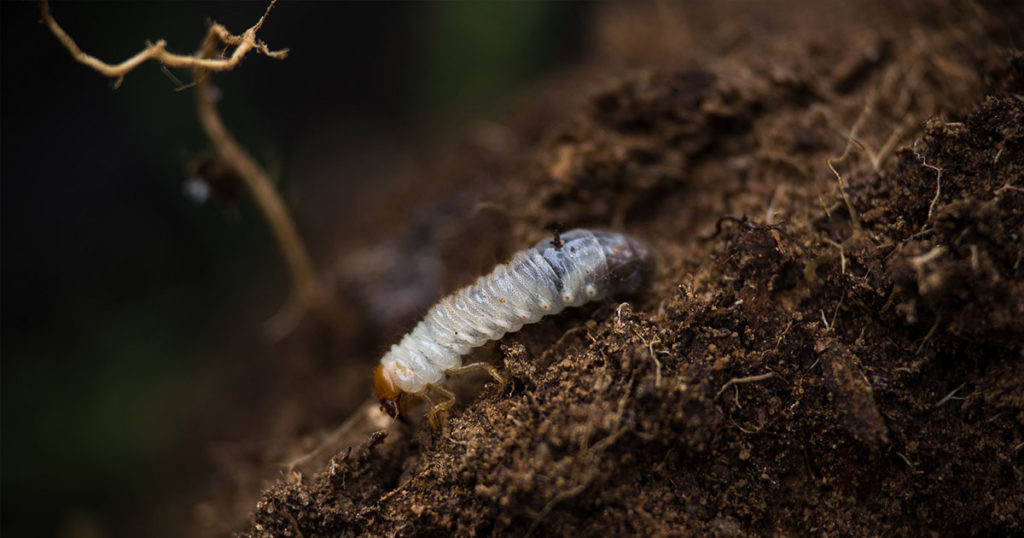
Termites are small. I’ve never seen one. Woodworms are elusive, and though I’ve treated tables and wardrobes they’ve infested, I’ve never seen one of these either. But wood caterpillars are so big it’s hard to miss them if you’re disturbing their feeding grounds. And if you split open a rotting log where one lives, you’re sure to see the creature, fatter than my forefinger and about as long. Roundheaded borer is what they’re called, and they are the larvae of the longhorn beetle, which comes in fantastically beautiful variety. Nothing beautiful about the globby, advancing larva, though. Yuck, I thought when one fell out of the pulpy log I was cutting up for firewood. The wood wasn’t much good any more as fuel, but when the caterpillar tumbled out, I was astonished at the use it had made of the log, tunneling, burrowing, excavating. I called my son over to see. The creature was enormous, creamy white, and segmented, with a red mouth. My son was impressed. He pulled out his cell phone and took a picture. “Let’s get it out of harm’s way,” I said as my son turned away, his attention on the photo now instead of the bug. “Pick it up, why don’t you.”
He paused and looked at the thing. “With my fingers?”
“What else?”
He shook his head. “You found it, you pick it up.”
In Spanish you don’t say, “I picked it up with my fingers.” Instead, you speak of your fingers as if they were not yours: “I picked it up with the fingers.” Lo recogí con los dedos. It’s the same with other body parts. I brushed myself the teeth after dinner, or I bit myself the tongue. The reflexive trumps the possessive, and even without the reflexive, possession is tenuous, as in a sentence like, “He treats the friends well.” Try picking something up with the fingers and you’ll see how tenuous is the connection between your mind and your digits. And the teeth are these chunks of cementum and enamel, and they aren’t even in your mouth but the mouth.
So where are you? You are the string that ties the parts together, like the strings or loops of wire that hook the limbs of an antique doll to the body. That’s what you are—the ligaments, flexible or stretchy at first but eventually brittle and tending to break. Without that band holding everything in place, you are merely parts, not even your parts, just the parts. I’ve felt a sort of disconnection at times trying to manipulate a pencil with numb fingers or trying to walk when my feet are asleep. It’s not me at the end of my limbs, it seems at those times, but parts, loose parts. How can this all work, I wonder.
The Scottish philosopher David Hume was also baffled by causal connection. How, he asked, is it possible that a thought in my mind results in my hand moving? How much harder, it seems to me, to understand the causal connection if the hand that moves is grammatically not even yours. And yet, if Spanish grammar teaches a kind of remoteness, then Spanish speakers might be less perturbed than English speakers by the kind of philosophical conundrums that occupied the empiricists. Were I 25 again, I’d pick up a pen and write a thesis on the matter. I’d use the fingers to do it, the mind to plan it, the friends to cheer on the success. Yes, the success—everyone’s and everything’s, shared, like the blame if the fingers dropped the pen and the hand wiped itself across the brow and the mind questioned, Why?
I’m not 25 and won’t be again. But I can bend over and scoop up a fat caterpillar. Pick it up I did, that soft, undulating worm. Using a dull stick, I managed not to pinch or poke but roll the creature onto a wide flat piece of bark and then deposit it in some thick brush. With my very own fingers making the necessary movements. Much better than stepping on it, though had I done that, by accident, it would have been the foot at fault or perhaps even the worm, going and getting itself stepped on.

